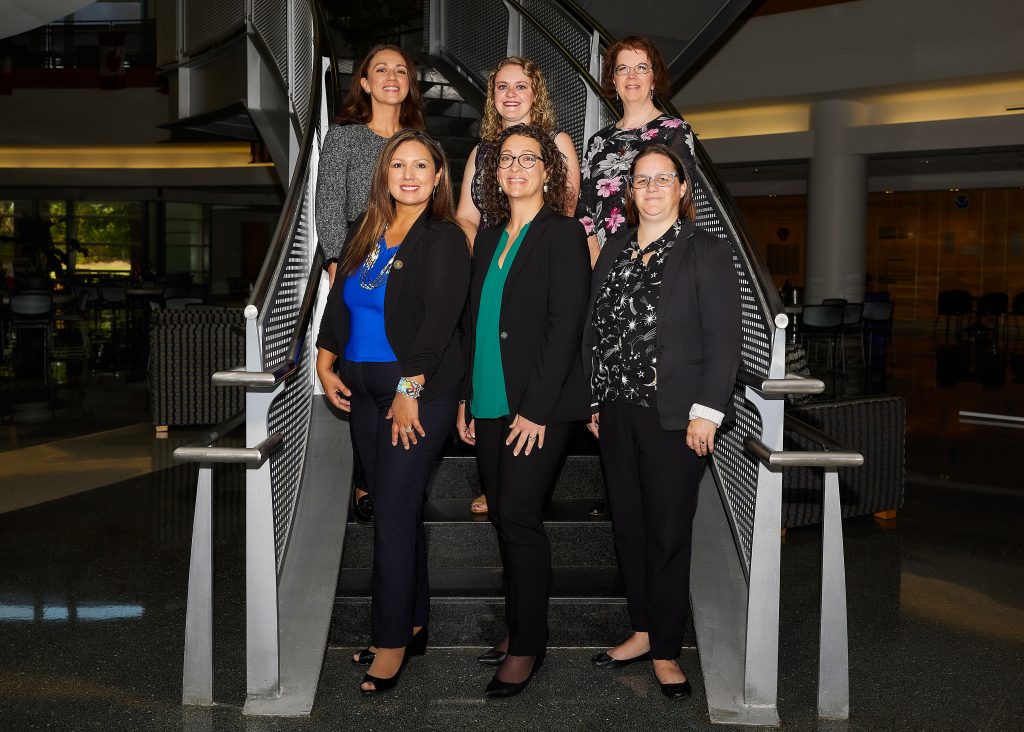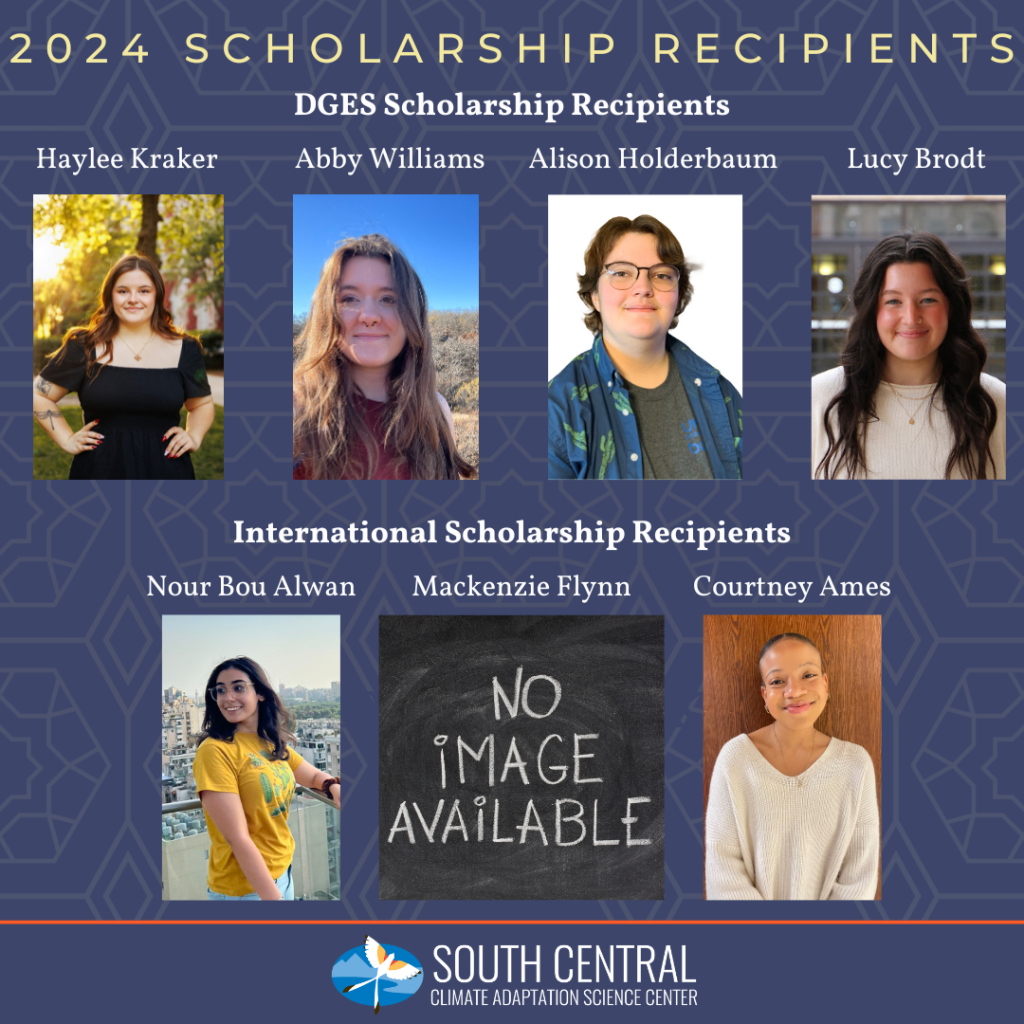South Central CASC transition to minimal operations
September 25, 2025
Dear South Central CASC Partners and Supporters,
Federal funding for the South Central Climate Adaptation Science Center (CASC), along with the Northeast and Pacific Islands CASCs, ends on September 30, 2025. Our CASC team submitted a competitive proposal to the U.S. Geological Survey (USGS) in late January 2025 to continue hosting the Center at the University of Oklahoma, with a new host agreement to begin on August 1, 2025. USGS provided us two additional months of funding while they waited for the U.S. Department of the Interior (DOI) to approve new cooperative agreements for the three CASCs. Unfortunately, no such approval has been given.
As a result, we will be forced to drastically reduce the services we provide to partners. Although the FY26 House and Senate budget markups emphasize the bipartisan and bicameral support for the CASC network going forward, our full-year funding is unavailable for CASC student, staff, and faculty salaries; engagement activities with Tribes and resource managers; travel and workshops; communication products; and research administration.
Beginning October 1, 2025, the South Central CASC will fully transition to minimal operations until such time when the DOI approves our FY25 funding. Without base funding, we will be unable to participate or lead any new projects, programs, or services. Existing efforts also will be paused or reduced in scope until we receive our funding, which is currently being withheld by DOI and the Office of Management and Budget (OMB) for our CASC and the two other regional CASCs.
Without funding for the South Central CASC, we are unable to add new expertise for climate adaptation or grow new partnerships with Tribes and Federal and State agencies across Louisiana, New Mexico, Oklahoma, and Texas. We had planned to add six additional consortium members to our team, hire four postdocs to conduct relevant research driven by your needs, develop our region’s STEM workforce, and develop a new Actionable Research Program to translate science into action regionwide. At this time, none of this proposed work will be able to move forward and many existing services will cease.
Projects funded through other sources (e.g., BIA, NSF, NOAA) will continue. Please ask your Tribal Liaison or CASC project manager/member how your project may be affected.
You may still contact us through info@southcentralclimate.org, but expect delays and reduced services.
Sincerely,
The South Central CASC Leadership Team
Dr. Renee McPherson, University Director
Dr. Tom Neeson, University Associate Director
Emma Kuster, University Assistant Director
Empowering Tribal Communities: $4M Grant Boosts Climate Research and Training
South Central CASC consortium members at the University of Oklahoma, the Chickasaw Nation, and the University of New Mexico lead this awarded project.
August 20, 2024
NORMAN, OKLA. – Researchers at the University of Oklahoma, in partnership with the Chickasaw Nation and the University of New Mexico, have received a $4 million grant from the National Science Foundation for their project to establish sustainable research and education partnerships to build climate resilience in tribal communities across Oklahoma and New Mexico.

The principal investigator of the grant is Elinor Martin, Ph.D., an associate professor and Edith Kinney Gaylord Presidential Professor in the OU School of Meteorology. It is funded through the NSF Established Program to Stimulate Competitive Research, EPSCoR, which aims to advance geographic diversity in STEM fields. EPSCoR boosts research competitiveness in targeted regions through investments in talent and infrastructure. The funding given to the University of Oklahoma, University of New Mexico and the Chickasaw Nation is part of $77.8 million funding initiative supporting 14 projects awarded by EPSCoR.
“Every part of our nation has been impacted by the changing climate. We build a sustainable future for all by investing in climate resilience research and solutions across our country,” said NSF Director Sethuraman Panchanathan. “By empowering researchers from different EPSCoR jurisdictions and enabling collaborations across diverse institutions from the Mountain West to the Gulf Coast, from the Southwest to the mid-Atlantic and New England and beyond, we are driving innovation that fosters STEM opportunities, economic growth and climate resilient communities.”
“We are working to establish respectful, reciprocal and sustainable research and education partnerships,” said Martin. “A theme throughout the project is adaptation planning. Tribal communities have been adapting [for climate change] and have been at the forefront of this for a long, long time, but they have generally not been included in the research and planning process.”
Jennie Mosely — director of Land Sustainability and Services for the Chickasaw Nation, a principal investigator with the South Central Climate Adaptation Science Center at OU and a lead on this project — says that tribal leadership support is part of what makes this work possible.
“Chickasaw Nation Governor Bill Anoatubby is very supportive of our environmental, natural resources, and wildlife programs as well as our land sustainability,” said Mosely. “He values these partnerships and supports the use of our time, expertise and focus to do what is needed not only for the Chickasaw Nation but for other tribes in Oklahoma as well.”
This project, Enhancing Indigenous Community Resilience to Climate Change Impacts through Partnerships and Co-Development of Adaptation Planning, will improve the resilience and well-being of tribal communities regarding climate change. The research topics will be based on community needs and interests. Mosely says that drought, and consequently water, will be an important area of focus, as well as increasing preparedness for severe weather events.
Current plans include partnering with tribes to build capacity to monitor and manage their own air quality through acquiring new air quality sensors and training community members on how to deploy the sensors and collect and interpret data. The project will also provide water quantity research that will help enable Indigenous communities to evaluate how changes in water quantity will affect their plans for food sovereignty and cultural practices.
On top of the research portion of the project, an education and training branch of work will foster a new generation of Indigenous scientists and students in climate change disciplines.
“Within this grant, a goal is to connect youth with Indigenous elders’ knowledge,” said Mosely. “We want to pass our land knowledge down and make sure we bridge the gap of understanding on our cultural resources and what we can do to protect them.” In the journey to Oklahoma Territory, during removal, our people had to endure hot summers and deadly winters. This journey showed the resilience of Chickasaw people in the pursuit of land. That ties to the work we’ll be doing with this grant and that makes me truly excited,” said Mosely.
A summer internship program will be established for undergraduate and graduate students. Interns from different educational backgrounds will engage in practical, community-based projects, often in their own communities. The projects will address real-world issues, providing tangible benefits to the communities involved and the students themselves, aiming to support the long-term career development of Indigenous students and scientists. The program will not only educate future scientists but will also build research capacity. Martin says a majority of the research team have existing connections to tribal communities or are members of tribal communities themselves. Lani Tsinnajinnie, Ph.D., assistant professor in the University of New Mexico’s School of Architecture and Planning and another lead on the project, is also part of the Indigenous Design and Planning Institute, an initiative that engages individuals in culturally responsive practices related to Indigenous design and planning.
Amelia Cook remarks that the curriculum weaves together multiple perspectives, emphasizing the importance of understanding climate resilience from both a scientific and cultural standpoint. This approach strengthens students’ functional climate literacy but also empowers them to become leaders in their communities, equipped with the knowledge and skills to address climate challenges in ways that honor and sustain our cultural heritage.
By prioritizing the needs and interests of these communities, the project aims to create lasting impacts that not only address immediate climate challenges but also foster long-term sustainability and empowerment. Martin says this effort is another step toward recognizing and valuing the contributions of Indigenous communities in the broader scientific and environmental landscape.
Learn more about Martin’s Climate Variability and Change Research Group.
About the project
‘Enhancing Indigenous Community Resilience to Climate Change Impacts through Partnerships and Co-Development of Adaptation Planning’ is funded for $4 million over two years. It is funded through the National Science Established Program to Stimulate Competitive Research.
Original press release by OU can be found here.
South Central CASC a partner in $2 million collaborative project award through NOAA
August 5, 2024
The South Central Climate Adaptation Science Center (CASC) at the University of Oklahoma is a partner in a collaborative project awarded almost $2 million by the National Oceanic and Atmospheric Administration (NOAA). The project will work to make communities in Southwest Louisiana and Central Acadiana more resilient against climate-related disasters, including hurricanes, wildfires and other severe weather events.
The South Central CASC region includes Oklahoma, Louisiana, New Mexico, and Texas. Tulane University leads the project through the ByWater Institute. Additional partners include the University of Louisiana at Lafayette, the nonprofit organization Micah 6:8 Mission, and the William Averette Anderson Fund.
Secretary of Commerce Gina Raimondo recently announced the award as part of almost $60 million in funding for projects aimed at strengthening climate resilience in Louisiana. The efforts are part of the Climate Resilience Regional Challenge, a $575 million competitive program funded through the Inflation Reduction Act.
Southwest Louisiana and Central Acadiana are defined by their shared natural characteristics, linked climate hazards, and rich culture and history. Many communities in the region are still in the process of recovering from devastating hurricanes Laura and Delta, which both hit the Louisiana coast in 2020. Additional events causing significant destruction in the last two years include severe winter storms, severe flooding, tornadoes, and wildfires.
The project will develop a shared vision and sustainable, resilience-focused action plan for communities in the region. It will advance climate resilience through community-based planning and regional governance, establishing a collaborative that includes multiple jurisdictions and Tribal governments, community-based entities and watershed districts. It aims to strengthen community and governmental capacity for adaptive action responsive to the needs and desires of people within the region.
The South Central CASC’s roles in the team will include characterizing climate risks, such as heavy precipitation, sea level rise, and extreme heat; co-designing community engagement processes; analyzing community engagement results; and developing technical information materials. Dr. Sharon Hausam, Climate Adaptation Planner and Research Scientist, is the South Central CASC team lead, working with Dr. Dolly Na-Yemeh, Climate Adaptation Specialist.
This award is part of the broader NOAA Climate-Ready Coasts initiative, which focuses on investing in high-impact projects that create climate solutions by storing carbon, building resilience to coastal hazards, restoring coastal habitats, building the capacity of communities, and providing employment opportunities.
South Central CASC Student Research Assistant NOAA Named Hollings Scholar
May 1, 2024

Liam Thompson, student research assistant, was recently awarded the 2024 NOAA Hollings Scholarship. Liam tells us while the project sites are not out yet “I am definitely going to be on the lookout for a project that allows me to get experience with general/urban climate modeling (e.g. understanding how pollution and aerosols impact our atmospheric circulations / atmospheric radiation budget), understanding the El Nino Southern Oscillation, or something somewhere in between. I am excited to see what I do and where I go with this scholarship.”
Congratulations Liam!
South Central CASC Annual Student Scholarship Award winners
April 29, 2024
Congratulations to the 2024 recipients of our two center scholarships!

Our DGES Scholarship recipients are:
Haylee Kraker – Senior studying Environmental Sustainability
Abby Williams – Junior
Alison Holderbaum – Sophomore in Geographic Information Science and Information Science & Technology
Lucy Brodt – Freshman in Environmental Sustainability and Dietetics
Our International Scholarship recipients are:
Nour Bou Alwan – Chemical Engineering major with a focus in sustainability and will be studying in Paris, France
Courtney Ames – Junior in Meteorology attending Reading, England in the Fall 2024 semester
Makenzie Flynn
South Central CASC University Director awarded Regents’ Award
April 10, 2024
Center University Director Dr. Renee McPherson was selected for the 2024 Regents’ Award for Superior Professional and University Service. She was honored during the 2024 University of Oklahoma Faculty Awards and Honors presentation. You can see the announcement and all other award winners here. Congratulations!